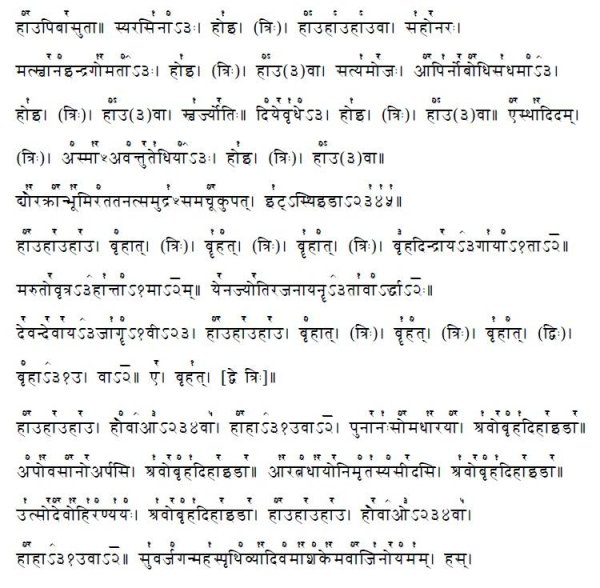Dear Sangom Sir,
I do not understand why you should record such inexactitudes. Now once again I have to take you back through all that conversation. Well, let me do that briefly so that members here get the correct picture:
Dear Shri raju,
As you said earlier, I don't want to batter the batter again and again. Now that you have spelt our your side, let the readers decide.
This was quoted by me and replied to in post #97 as:
I am sure you will agree that it is possible to understand the eternity of knowledge about Reality in a scheme of philosophy in which the governing principle of the universe is held to be a supreme consciousness. Omniscience is there at the heart of existence and hence the knowledge of Reality is there from eternity. That is why I said in my earlier (scholarly!!) post that the linguistic embodiment is also to be taken as eternal. Fluctuation in self-expression is a mark of finite intelligence. I repeat vedas constitute eternal knowledge as embodied in an eternal form. All spiritual apprehension is a revelation or communication. The secondary arguments that support this position are: There is an unbroken continuity of vedic tradition and there is no memory of, or reference to, its author or authors any where
"to know" requires a knower as well as what is it that is known. Simply saying "Rama knows" without any context, will be confusing, imo; but if it is said "Rama knows music", "Rama knows palmistry", etc., then it will make sense. Here, we have
"a supreme consciousness" which is the governing principle of the universe. You then say
"Omniscience is there at the heart of existence and hence the knowledge of Reality is there from eternity." Now omniscience means "infinite knowledge" and hence it will require a knower and what that knowledge is about. Even if it is taken that all possible types of knowledge is taken as the answer to the second point, we have to specify the knower. This had not been done and by that time tks had already come in with his arguments. So, I let this slip out.
Now that you have brought this again, let me quote from Matsya Purana, the following :
विष्णोर्मत्स्यावतारे सकल वसुमतीमण्डलं व्यश्नुवाना-
स्तस्यास्योदीरितानां ध्वनिरपहरतादश्रियं वः श्रुतीनाम् ॥ १
viṣṇormatsyāvatāre sakala vasumatīmaṇḍalaṃ vyaśnuvānā-
stasyāsyodīritānāṃ dhvanirapaharatādaśriyaṃ vaḥ śrutīnām || 1
(This says dhvani: apaharatād aśriyaṃ vaḥ śrutīnām, or, the śrutīs (vedas - please note the plural; so this event happened after there was more than one veda signifying the eternal single knowledge) from which the sound (dhvani

had been stolen (apaharatād), as a result of which they had become aśriyaṃ or unholy. The story is that vishnu in the form of fish avataara, retrieved the vedas from the nether world where hiranyaaksha, the daanava had hid them. Strangely however the above first sloka is not borne out in the body of the Matsya Purana wherein the reference is given to Koorma avataara for the retrieval of the stolen vedas. Stranger is the fact that, to the best of my ability, I don't find any mention of this in Koorma Purana which deals with lifting of the Manthara mountain when it sank during the churning of the ocean of milk!
So, we find that even at the time of Matsyaavataara, more than one śruti.
Now we come to the very famous puruṣa sūktaṃ. It says —
तस्माद्यज्ञात्सर्वहुतः ऋच: सामानि जज्ञिरे ।
छन्दांसि जज्ञिरे तस्माद्यजुस्तस्मादजायत ॥
tasmādyajñātsarvahutaḥ ṛca: sāmāni jajñire |
chandāṃsi jajñire tasmādyajustasmādajāyata ||
I hope there will be no brahmin worth his salt who does not know the meaning of puruṣa sūktaṃ. This ṛk says that the three vedas ṛk, saaman and yajus were born (jajñire) from 'that yajña', the puruṣa sacrifice. Hence, on the authority of the puruṣa sūkta, we can safely conclude that there was no single veda (eternal knowledge) but three different vedas, the ṛk, saaman and yajus and all the three were "born" as a result of the said sacrifice; so these vedas did not exist before that.
Who all did this sacrifice? तॆन देवा अयजन्त साध्या ऋषयश्चये (tena devā ayajanta sādhyā ṛṣayaścaye). The devās, sādhyās and the ṛṣis. Hence, it may not be fallacious to say that the ṛṣis were the producers/manufacturers/authors/composers of the three vedas.
Again, the famous ṛk —
इमं मे गंगे यमुने सरस्वति सुतुद्रिस्तोमँ सचतापरुष्णिया ।
असिक्निया मरुद्वृढे वितस्तयार्जिकिये शृणुह्या सुशोमया ॥ १० - ७५-०५
imaṃ me gaṃge yamune sarasvati sutudristomam̐ sacatāparuṣṇiyā |
asikniyā marudvṛḍhe vitastayārjikiye śṛṇuhyā suśomayā || 10 - 75-05
This lists all the main North-Indian rivers (excluding the Brahmaputra) but does not include any of the south-indian rivers. Are we to believe that the eternal knowledge which existed side by side with the Parabrahman (the governing principle of the universe) did not even know beyond the small area of North India so that at least all the major rivers of India could be listed out?
Now the question is how can we say that the vedas represent eternal knowledge and are apaurusheya? I leave it to you to decide.

